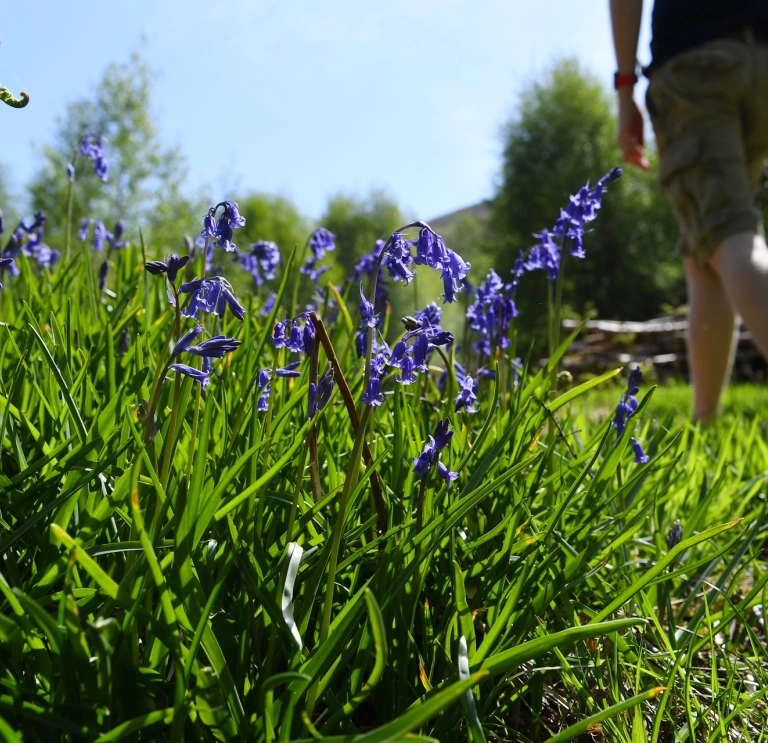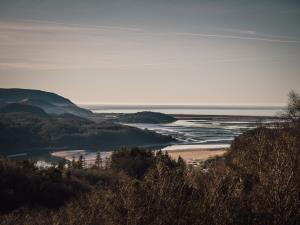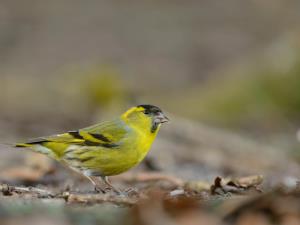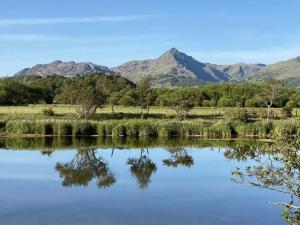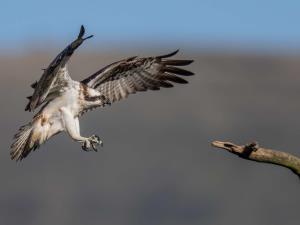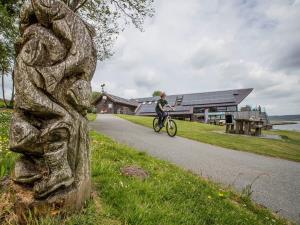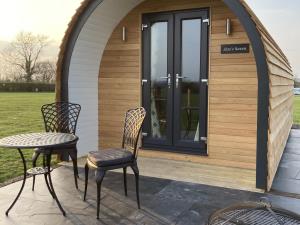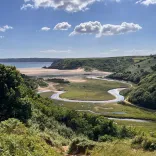Family cycling on the Mawddach Trail
For a scenic family cycle, the Mawddach Trail is unbeatable. It runs for nine traffic-free miles (15km) from Dolgellau to Barmouth along an old railway line, with glorious views of the mountains around Cader Idris and the shimmering waters of the Mawddach Estuary. Spring is the loveliest time to visit. The verges burst with wildflowers, and birdlife twitters in the two RSPB reserves you’ll pass along the way: Coed Garth Gell and Arthog Bog. There’s a grandstand finish along the iconic wooden railway bridge into Barmouth, where tea and ice creams await on the beach.


White water rafting in Eryri (Snowdonia)
The upper reaches of the River Tryweryn are magical in spring: wildlife is at its most active and the river is canopied with fresh oak leaves. Although dam-releases make this a year-round rafting river, spring sees the Tryweryn at its most punchy. At this time of year, the National White Water Centre's Olympic-grade white water runs like The Graveyard and Ski Jump deliver their biggest hits. According to some guides, chilly water adds to the excitement. It's a good thing modern wetsuits are wonderful.
Bird watching on Skomer Island
From May to June, this wild island off south-west Pembrokeshire is not just a nature reserve – it's a Welsh safari. Around a third of a million birds breed on its cliffs: puffins, fulmars, razorbills, guillemots and up to half of the world’s Manx shearwaters. The waters around Skomer and neighbouring Skokholm are also great for seals, dolphins and porpoises. Wildlife at close-quarters is guaranteed and with the island carpeted in wild flowers, so is scenery.
Check out the The Wildlife Trust of South and West Wales' YouTube channel for live streaming from their wildlife cameras during the main breeding season.

Salmon fishing in the River Usk
Although summer is beautiful for lazy days and warm nights, spring is the fishing season to raise the pulse. From March to May, high water levels disperse large fish to spawn upriver from the estuaries. River beats and tributaries of the Usk, probably the best freestone river in the country, teem with wild brown trout, while 20lb salmon bite in the Wye, even above Builth Wells. The scenery’s at its best at this time of year too.

Watch ospreys fishing for their supper
Our magnificent ospreys spend the winter in West Africa but they come home each spring to breed, usually arriving in April. They’re a thrilling sight in the skies above North Wales, especially if you spot one fishing: they can snatch fish up to 2kg in weight from the rivers and lakes. You’re pretty much guaranteed a sighting at the Dyfi Osprey Project reserve near Machynlleth, Glaslyn near Porthmadog, and Llyn Brenig in Cerrigydrudion: all have visitor facilities with prime viewing spots. And the best thing is the chicks from previous years are now returning as adults - hopefully to start new families of their own.
During the spring and summer months, you can watch the ospreys and their chicks via live stream:
Walk the Pembrokeshire Coast Path
If you only walk one trail all year, make it the Pembrokeshire Coast Path in spring. From late April the 186 miles (300km) of Britain’s favourite footpath are at their best. The cliffs and hedgerows are bursting with flowers, and the birdlife is at its most active. It’s easy to break down into short hops by using the excellent coastal bus services; if you walk the whole thing you’ll have climbed the equivalent of Mount Everest.


National Geographic magazine- Pembrokeshire Coast PathTowering headlands blanketed with spring blooms.”
Stay on a Welsh farm
With the spring lambs on the hills, and the young calves taking their first steps outdoors, it’s the perfect time to escape to the country by staying in a lovely old farmhouse or cosily converted cowshed. There are many farms where you can stay. Farmers open their homes to provide top quality B&Bs with superb Welsh farmhouse breakfasts. They also have lots of self-catering options in barn conversions, bunkhouses, and camping and caravan sites.

Try mountain biking at the Afan Forest
Wales has some of the best (and most challenging) mountain biking facilities in the world, but we want everyone (even total novices) to be able to have a bash. The Rookie Trail at Afan Forest is a great place to start: it’s unscary enough that the whole family can hire bikes and get acquainted with this fabulous sport.
When you’ve mastered the basics, you can venture up into the 60+ miles (100km) of flowing trails that wind through a forest which, at this time of year, will be alive with spring flowers.

Walk in a bluebell wood
The purple haze of bluebells is one of Wales’ greatest natural wonders, and they peak in early May. It’s hard to pick a favourite place to see them, because they look spectacular in any ancient woodland setting - of which we’ve got plenty. The Woodland Trust and Wildlife Trust can point you in the right direction. Incidentally, the bluebell has a couple of lovely Welsh names: bwtsiasen y gog means ‘cuckoo’s boots’ while cloch yr eos is ‘nightingale’s bell’. Oh, and our ancestors used bluebell-bulb glue to stick feathers to their arrows.

Walk the Carmarthenshire Fans
The Carmarthenshire Fans, that’s ‘fans’ pronounced ‘vans’, is on the wildly wonderful western edge of the Bannau Brycheiniog (Brecon Beacons) mountain range, and the least visited of its peaks. It’s a good family walk from the car park near Llanddeusant: hard enough to feel like a proper mountain, but easily doable in a morning. At the top, the jagged escarpment of Picws Du plunges down into the depths of Llyn y Fan Fach, home of the legendary Lady of the Lake. And if you don’t see a multitude of red kites along the way, we’ll give you a piggy-back down. Honest.



